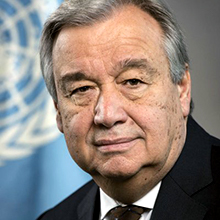
On this solemn day of remembrance, let’s pledge to stand as one against all forms of hatred and discrimination.Secretary-General's Message
⇨ 30th Anniversary
2024 Commemorations — 30th Anniversary
International Day of Reflection on the 1994 Genocide Against the Tutsi in Rwanda
Secretary-General's Message for 2024
On this day in 1994, and for the nearly 100 days that followed, one million Tutsi children, women and men were killed by their fellow Rwandans.
Families turned against families, friends became foes, and a dark spirit of intentional and brutal violence engulfed a nation.
We will never forget the victims of this genocide. Nor will we ever forget the bravery and resilience of those who survived, whose courage and willingness to forgive remain a burst of light and hope amidst this dark chapter in human history.
This year, we remind ourselves of genocide’s rancid root: hate.
To those who would seek to divide us, we must deliver a clear, unequivocal and urgent message: never again.
We can draw a straight line between the senseless slaughter of one million Tutsi — as well as some Hutu and others who opposed the genocide — and the decades of hate speech that preceded it, enflamed by ethnic tensions and the long shadow of colonialism.
Today, around the world, the darkest impulses of humanity are being awakened once more by the voices of extremism, division and hate.
On this solemn day of remembrance, let’s pledge to stand as one against all forms of hatred and discrimination.
Let’s ensure that the acts that began on April 7, 1994 are never forgotten — and never repeated. Anywhere.
— António Guterres
Videos
Secretary-General's Remarks
(00:05:12)
General Assembly President's Remarks
(00:10:54)
30th Anniversary – Feature
(00:00:54)
Annual Commemoration - NYC
(01:16:11)
Annual Commemoration - Geneva
(01:54:38)
Annual Commemoration - Nairobi
(01:51:34)
Memory of Genocide: Story of Survival in Rwanda
(00:07:53)
Eric Eugene Murangwa: "Football saved my life"
(00:16:35)
Rwanda and the Power of Post-genocide Reconciliation
(00:00:54)

